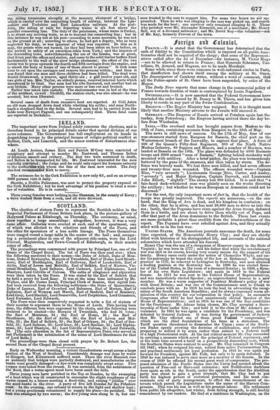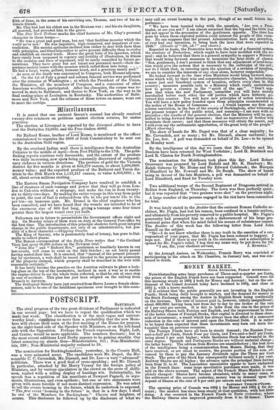furrigu gar (Laguna.
FRANCE.—It is stated that the Government has determined that the oath of fidelity to the Constitution which is imposed on all public func- tionaries shall not be required of the clergy ; that some of the Represent- atives exiled after the 2d of December—for instance, M. Victor Hugo —are to be allowed to return to France ; that Generals Schramm, Cas- tellane, St. Arnaud, and Magnan, are to be made Marshall.
Some while since there were rumours in well-informed circles in Paris, that disaffection had shown itself among the military at St. Omer, The Emancipate:4r of Cambray states, without a word of comment, that all the Police-agents of St. Omer have been suspended, by order of the l!dayor.
The Daily News reports that some change in the commercial policy of France towards freedom of trade is contemplated by Louis Napoleon.
Swrrzeriessre.--It is now asserted that the Federal Government have rescinded the order issued by M. Douey to M. Thiers, and has given him liberty to reside in any part of the Swiss Confederation.
BELOMM.—The Rogier Ministry has resigned. But it is thought most likely that another Ministry adverse to the Jesuits will succeed it.
GERMANY.—The Emperor of Russia arrived at Potsdam again last Sa- turday, from Petersburg ; the Empress having arrived there the day be- fore from Wiesbaden.
INDIA..—The overland mail has brought papers from Madras to the 10th of June, containing accounts from Rangoon to the 26th of May.
The news is still news of success. On the 17th of May, four of our war-steamers started from Rangoon for B8880113, the chief port on the Westernmost branch of the Irawaddy, to capture that place. A force of 400 of the Queen's Fifty-first Regiment, 300 of the Ninth Native Madras Infantry, 60 Sappers and Miners, and a number of Marines, was landed at Bassein on the 19th. The place was defended by 4000 Burmese troops and 2000 armed "men of Bassein," fighting behind stockades well mounted with artillery. After a brief parley, the place was tremendously battered by the guns of the steamers, and then taken by storm. The de- fence was bravely made. We lost three men killed, and had seven officers and twenty-four men wounded. The officers wounded were—Captain Rice, "very severely "; Lieutenants George :Rice, Carter, and Ansley, "severely "; and Major Errington, Captain Darrock, and Lieutenant John Elliott, "slightly." The enemy lost 800 killed. It is said that "a fair-faced dark-whiskered man was plainly seen on the works directing the artillery ; but whether he was an European or Armenian could not be discerned.'
For the rest, the only important news of fact is, that the health of the troops was greatly improved. The reports are numerous,—on the one hand, that the King of Ave is dead, and his kingdom in confusion ; on the other, that he is alive, and has sent 20,000 men to drive us into the sea ; lastly, that the Peguans have risen against the Avan troops, defeated them in a battle, and are about to drive them wholly out of Pegu, and offer that part of the Avan dominions to the British. These last events are more probable a priori than credible from the trustworthiness of the report. The Peguans have ever rebelled against A.va, and they actually sided with us in the last war.
17isrren SrarEs. The American journals announce the death, for some time expected, of the Honourable Henry Clay ; and they are. chiefly filled with histories of his distinguished life and accounts of the national solemnities which have attended his funeral.
Henry Clay was the son of a clergyman of Hanover county in the State of Virginia ; he was born in 1777; and his father died while the revolutionary war was still in its course, leaving very scanty means for the support of his family. Henry came early under the notice of Chancellor Whyte, and un- der his patronage he began the study of the law at Richmond. Beginning practice in 1797, he removed to Lexington in Kentucky, and soon attained a leading position at the Kentucky tar. In 1806 he was elected Sena- tor of the United States, in the room of a deceased Senator ; in 1808, a Mem- ber of his own State Legislature; and again in 1810 to the Federal Senate. In 1811 he was sent to the Federal House of Representatives, and was immediately elected Speaker ; an unprecedented honour to a new member. He was a warm supporter of President Madison's policy of war with Great Britain ; and was one of the Commissioners sent to Ghent to conclude peace with us. In 1818 he took the lead in advocating the recog- nition of the South American Republics ; and he always expressed warm ad- miration of this country for our cooperation in that policy. In successive Congresses after 1815 he had been unanimously elected Speaker of the House of Representatives and in 1824 he was one of the four candidates for the Presidency. Mr. Adams being chosen, Mr. Clay accepted a Secre- taryship of State under him ; and held it to the close of Mr. Adams's go- vernment. In 1831 he was again a candidate for the Presidency, and was defeated by General Jackson. It was during the government of Jackson that Mr. Clay effected one of those peat Federal " compromises " which are the chief foundations of his fame as a statesman. The Tariff question threatened to dismember the Union ; some of the South- ern States openly avowing the doctrine of nullification, and stubbornly preparing to defend it by arms, rather than submit to a Federal tariff of a high Protectionist Buie. At the last critical moment Mr. Clay succeeded in carrying a measure which saved the principal of Federal supremacy, and at the same time secured a tariff on a prospectively descending scale, which the Southern States were content to accept. Mr. Clay remained in Congress till 1842; when he resigned his seat, retired from active Parliamentary life, and practised assiduously his legal profession. In 1844 he was again put forward for President, against Mr. Polk, but only to be again defeated. In 1849 he was induced to serve once more as a member of the Senate. In the course of 1850 he effected his second great work of compromise. The pro- posed admission of the Pacific States into the Union had mooted afresh the question of Free-soil or Slave-soil extension ; and Nullification doctrines were again so rife in the South, under the apprehension that the Abolition party was about to gain a great triumph, that Mr. Clay had to put forth his highest powers of oratorical persuasion, and his most con- summate arts of party management, to effect the reconcilement of in- terests which passed the Legislature under the name of the Slavery Com- promise. This was his last as well as his greatest labour. His retirement from public life altogether, lust winter' from failing strength, is still freshly remembered by our readers. He died at a residence in Washington, on the 23th of June, in the arms of his surviving son, Thomas, and two of his in- timate friends.
Mr. Clay had lost his eldest son in the Mexican war ; and his six daughters, all married, had preceded him to the grave.
The New York Tribune marks the chief features of Mr. Clay's personal character in these terms- " He was a great and good man, but not 'that faultless monster which the world ne'er saw.' He was impulsive, high-tempered, and impatient of con- tradiction. His mental aptitudes inclined him rather to deal with facts than with principles, and fitted him rather to solve present difficulty than to evolve and establish an eternal truth. Hence the great body of his speeches, which have rarely been surpassed in cogency and fertility of illustration, in fitness to the occasion and force of argument, will be rarely consulted by future ge- nerations. They have great but not latent nor perennial merit—their im- portance mainly ceases with the occasion which called them into being He had a large, warm, gallant, humane heart, and a generous manly soul." As soon as the death was announced to Congress, both Houses adjourn- ed. On the 1st of July a grand and solemn funeral service was performed over the remains at Washington ; at which the President of the Union, the Ministers, all the members of Congress, and a concourse of other American worthies, participated. After the obsequies, the corpse was re- moved in state to Baltimore, and thence to New York, on the way to its final resting-place at Lexington in Kentucky. The authorities of Balti- more and New York, and the citizens of those towns en masse, went out to meet the cortege.



























 Previous page
Previous page